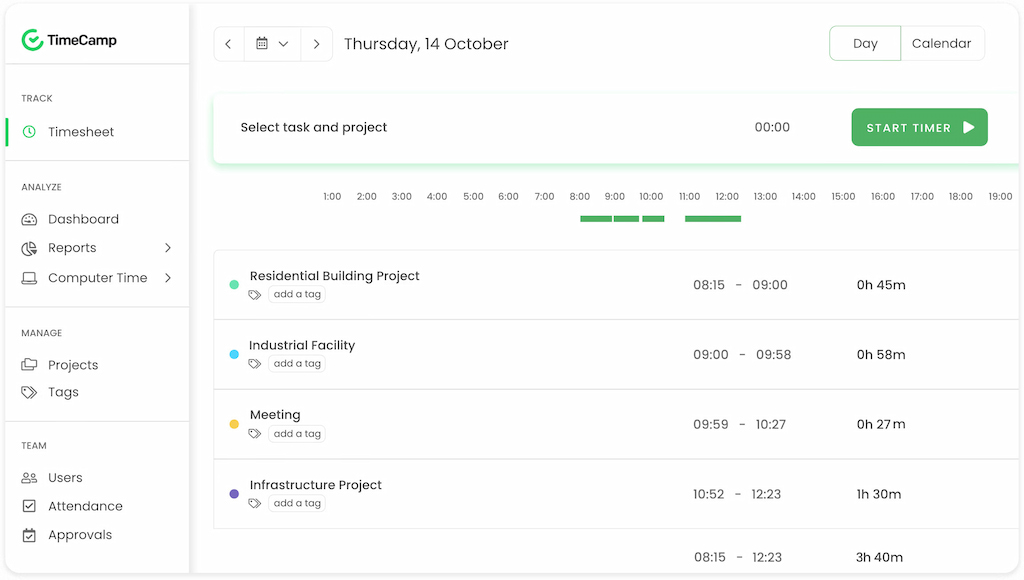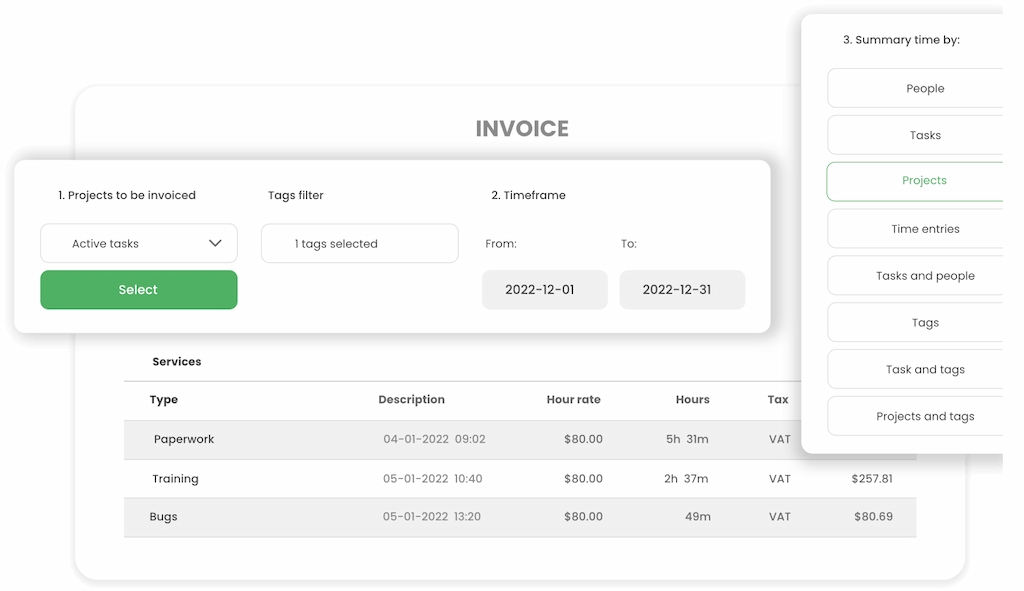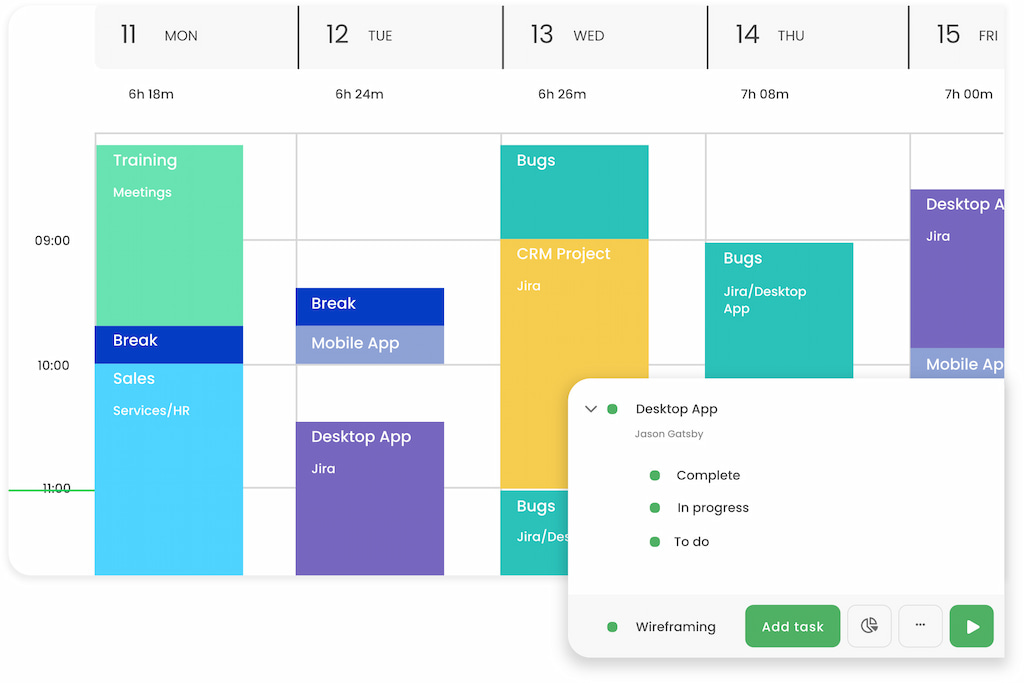TimeCamp is a time tracking and workforce management software designed for businesses that need visibility into employee hours, project budgets, and productivity. It offers automatic and manual time tracking, timesheets, attendance monitoring, billing and invoicing tools, payroll calculations, and detailed reporting. It also includes features such as desktop activity tracking, optional screenshots, geofencing for field teams, and integrations with popular project management and accounting tools. In this TimeCamp review, we take a closer look at its core features, pricing structure, usability, integrations, and support options to help you determine whether it’s the right fit for your team. We’ll examine its strengths, limitations, and ideal use cases, and provide context for how it compares to other time tracking apps on the market.
TimeCamp Review: Quick Verdict
TimeCamp is a workforce-focused time tracking software built around automatic tracking, attendance management, and payroll calculations. It combines timesheets, productivity monitoring, invoicing, and reporting in one platform, making it suitable for businesses that need structured oversight of employee work hours.
Its strongest capabilities include automatic desktop tracking, detailed reporting, and built-in payroll and billing tools. However, its feature set leans heavily toward monitoring and activity tracking, which may not align with teams looking for lightweight, privacy-first time tracking or advanced project budgeting tools.
Bottom line: TimeCamp is a practical choice for companies that prioritize time visibility, attendance control, and payroll-ready data. Teams focused more on project planning, budgeting, or integration-driven workflows may want to compare alternatives before deciding.
TimeCamp Pricing
TimeCamp offers four paid plans: Starter, Premium, Ultimate, and Enterprise, with both monthly and annual billing options. Pricing scales based on feature access, integrations, reporting depth, and administrative controls.
The main differences between plans involve budgeting tools, integrations, approvals, monitoring features (like screenshots), and enterprise-level deployment options.
| Pricing/plan | Starter | Premium | Ultimate | Enterprise |
|---|---|---|---|---|
| Monthly | $3.99 per user per month | $6.99 per user per month | $10.99 per user per month | $14.99 per user per month |
| Annual | $2.99 per user per month | $4.99 per user per month | $7.99 per user per month | $11.99 per user per month |
| Features | Unlimited tasks, Auto tracking, Idle time tracking, GPS location tracking, Time clock kiosk, Overtime tracking, Time-off Invoicing, Excel report export, Geofencing, No integration | Starter, plus: Billable rates, User roles, Budget and estimates, Apps & websites tracking, Project archiving, One integration | Premium, plus: Timesheet approval, Expense, Screenshots, Pivot table, Unlimited integrations | Ultimate, plus: Custom integrations, Set up sessions, Self-hosted instance, Private cloud instance, Priority support & SLA, Training and assistance |
TimeCamp Core Features
TimeCamp focuses primarily on time tracking and productivity monitoring. While it also includes features like project management, attendance tracking, and invoicing, these tools are more basic and don’t go much beyond the essentials. Let’s break down the core features and see how they actually perform.
Automated time tracking
TimeCamp automatically records work on apps, websites, and documents, reducing manual entry. This feature is ideal for freelancers and small teams who want a hands-free approach to logging hours.
![timecamp review: key features, pros & cons, pricing [2026]](https://blog-cdn.everhour.com/blog/wp-content/uploads/2026/02/timeamp-automatic-timer-1024x561.jpg)
Note: The timer may start before a task is selected, creating “uncategorized” entries that require manual sorting.
Keyword-based time tracking
Using keywords, TimeCamp assigns tracked time to the correct tasks based on document titles, app usage, or web activity. This simplifies tracking for employees handling multiple tasks.
![timecamp review: key features, pros & cons, pricing [2026]](https://blog-cdn.everhour.com/blog/wp-content/uploads/2026/02/timecamp-keyword-tracking-1024x561.jpg)
Note: Ensure consistent keyword naming across projects to avoid uncategorized time entries.
Timesheets and reporting
Managers and employees can view consolidated timesheets, approve entries, and generate detailed reports on hours, projects, and productivity. Reports can be exported in CSV, Excel, or PDF formats.

Note: Helps prevent time fraud, but mobile timesheet options are limited.
Invoicing and budgeting
TimeCamp lets users create client-ready invoices from tracked hours and manage project budgets. Expenses can also be linked to projects for better financial oversight.

Note: Works with QuickBooks, Xero, and custom integrations for other accounting or payroll systems.
Attendance and overtime management
Track clock-ins, clock-outs, idle time, and overtime, while employees can submit time-off requests. Managers can monitor compliance, especially for hybrid or remote teams.
![timecamp review: key features, pros & cons, pricing [2026]](https://blog-cdn.everhour.com/blog/wp-content/uploads/2026/02/timecamp-attendance.jpg)
Limitations: Overtime tracking relies on attendance tools, which can be cumbersome for larger teams.
Desktop activity monitoring
TimeCamp monitors activity across apps and websites, helping managers analyze productivity and identify workflow bottlenecks. Screenshots can be captured at set intervals for accountability.
![timecamp review: key features, pros & cons, pricing [2026]](https://blog-cdn.everhour.com/blog/wp-content/uploads/2026/02/timecamp-activity-1024x561.png)
Note: Screenshot frequency cannot be customized beyond default intervals.
Project management
Create projects, assign tasks, set budgets, and add descriptions or instructions. Track project time against budgets to manage costs.
Limitations: No Kanban boards, Gantt charts, or task dependencies, which makes advanced project visualization difficult.
Time-off management
Employees can request vacation, sick leave, or special leave, while managers can approve or reject requests from the web dashboard.
![timecamp review: key features, pros & cons, pricing [2026]](https://blog-cdn.everhour.com/blog/wp-content/uploads/2026/02/time-off-management-1024x644.png)
Note: Mobile approval and request options are limited, and the workflow can feel unintuitive for new users.
Geofencing and location tracking
TimeCamp allows managers to set virtual boundaries that automatically start and stop timers based on employee location.
![timecamp review: key features, pros & cons, pricing [2026]](https://blog-cdn.everhour.com/blog/wp-content/uploads/2026/02/timecamp-geofencing-1024x561.png)
Note: Useful for field staff, but automation may occasionally fail.
Integrations and APIs
TimeCamp integrates with tools such as Asana, ClickUp, Trello, Slack, and supports custom API integrations for unique workflows.
Security and compliance
TimeCamp follows industry best practices with 2FA, SSO, and role-based access control. Data is encrypted in transit and at rest, and TimeCamp complies with GDPR, HIPAA, and DCAA regulations.
Who is TimeCamp For?
TimeCamp is for teams that need detailed activity monitoring, automated time tracking, and project-linked budgeting.
Ideal users
- Managers tracking productivity: see app, website, and desktop activity in detail.
- Hybrid & remote teams: monitor attendance, overtime, and geofencing.
- Businesses managing budgets: link tracked hours to projects and invoices.
- Teams using multiple tools: integrates with PM, CRM, and payroll software.
Contrast
- Privacy-first or lightweight tracking teams may prefer alternatives like Everhour or Clockify.
- Teams that rely on Kanban boards (Trello), timeline views (Asana), or Gantt charts and workload planning (ClickUp, Monday.com) may find TimeCamp’s project management tools too basic.
Key takeaways
- detailed monitoring and productivity insights
- hybrid and remote team oversight
- project budgeting and invoicing
- not ideal for privacy-first or visual project management
Pros and Cons of TimeCamp
TimeCamp offers strong time tracking and workforce monitoring tools, but it has some limitations in project management and mobile functionality.
| Strengths | Limitations |
|---|---|
| Automated time tracking reduces manual input | Automatic tracking can create unassigned time entries |
| Keyword-based tracking across apps and documents | Requires consistent keyword setup for accuracy |
| Detailed desktop activity monitoring | May feel intrusive for privacy-focused teams |
| Project budgeting and invoice generation | Basic project management (no Kanban or Gantt views) |
| Attendance, overtime, and time-off tracking | Limited mobile approval features |
| Integrations with tools like QuickBooks and Xero | Fewer native integrations without customization |
| GDPR, HIPAA, and DCAA compliance support | No advanced biometric verification options |
FAQs
What is TimeCamp used for?
TimeCamp is used for automatic time tracking, employee activity monitoring, project budgeting, invoicing, and attendance management. Businesses use it to track billable hours, measure productivity, and control project costs.
Does TimeCamp monitor employee activity?
Yes. TimeCamp tracks application usage, website activity, and can capture screenshots if enabled.
It is good for teams that require detailed visibility into work activity. Teams that prefer privacy-first or minimal monitoring environments may consider lighter tracking alternatives.
Does TimeCamp include project management features?
Yes, but at a basic level. TimeCamp allows users to create projects, assign tasks, set budgets, and track time against them.
It does not include advanced visual planning tools like Kanban boards, Gantt charts, or task dependencies.
Can TimeCamp generate invoices?
Yes. TimeCamp converts tracked billable hours into invoices and supports integrations with accounting tools like QuickBooks and Xero.
This makes it suitable for agencies, consultants, and service-based businesses.
Is TimeCamp suitable for remote teams?
Yes. TimeCamp supports hybrid and remote teams through automatic time tracking, attendance monitoring, overtime calculation, and geofencing.
It is particularly useful for distributed teams that require accountability and activity visibility.
Is TimeCamp privacy-friendly?
TimeCamp is designed around activity visibility and monitoring. Organizations seeking a privacy-first time tracking approach with minimal oversight may prefer tools that focus strictly on manual time logging and project budgeting.
Does TimeCamp support compliance requirements?
Yes. TimeCamp supports GDPR, HIPAA, and DCAA compliance standards and includes role-based access controls and two-factor authentication.
Who is TimeCamp best for?
TimeCamp is best for businesses that prioritize detailed activity tracking, workforce oversight, and project-linked budgeting.
Teams focused primarily on advanced project planning or non-surveillance time tracking may explore alternative solutions.
When to Choose Everhour Instead
Choose Everhour if your team prioritizes project planning, budgeting visibility, and privacy-first time tracking over detailed employee activity monitoring.
Everhour is better suited for teams that want time tracking tightly integrated into their project management workflows without relying on app usage tracking or screenshot monitoring.
You may prefer Everhour if:
-
You use tools like Asana, ClickUp, or Trello as your core workspace.
Everhour integrates directly into project management tools, keeping time tracking inside existing workflows. -
You prioritize privacy-first tracking.
Everhour focuses on manual and task-based time logging rather than app-level activity monitoring or screenshots. -
You need clearer budget forecasting.
Everhour places strong emphasis on project budgets, cost tracking, and real-time profitability insights. -
You want structured project planning.
Teams that rely on task hierarchies and visual project management may find Everhour’s approach more aligned with planning-heavy workflows.
When TimeCamp may be the better fit
TimeCamp may be more suitable if your team requires:
- Detailed app and website activity tracking
- Workforce oversight across hybrid or remote environments
- Attendance and overtime monitoring
- Location-based tracking through geofencing

